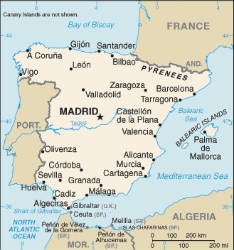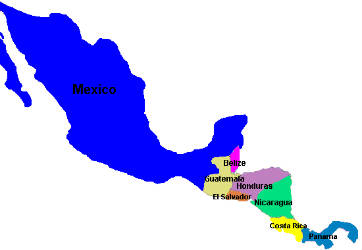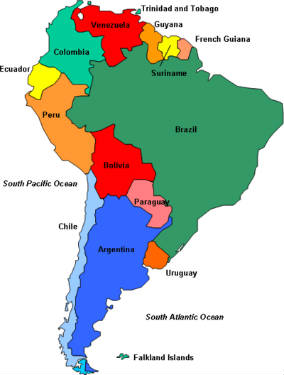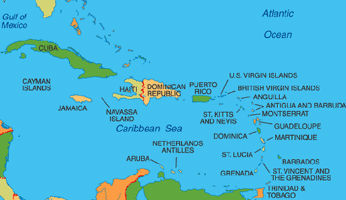Spanish Speaking Countries Maps, Capitals, and Games!
Spanish is the official language in Argentina, Bolivia, Chile, Colombia, Costa Rica, Cuba, Dominican Republic, Ecuador, Equatorial Guinea, El Salvador, Guatemala, Honduras, Mexico, Nicaragua, Panama, Paraguay, Puerto Rico, Spain, Uruguay, and Venezuela.
Review the Spanish speaking countries maps and note the capital of each of the Spanish speaking countries below. Test your knowledge of Spanish speaking countries maps and capitals with our fun quizzes and games!
| Spanish for Kids Spanish Speaking Countries | ||||||||||||
|---|---|---|---|---|---|---|---|---|---|---|---|---|
|
||||||||||||
| Previous | ||||||||||||
Countries That Speak Spanish
The maps above are provided for official Spanish speaking countries only. Although not officially recognized or sanctioned by the government, Spanish is spoken by significant populations in many other nations and territories. In these areas, public services and information are widely available in Spanish, as are multiple forms of print and broadcast media. To test your knowledge of Spanish culture, you may want to take our online Spanish test.
Spanish was spoken in the United States long before the United States existed! If you look at an old map of what is now the United States, you will observe that huge areas of the American Southwest and all of Florida was previously part of New Spain. Spanish is the most popular foreign language in United States. Spanish is the mother tongue of 41 million people who live in the USA. In addition, 11 million Americans speak Spanish as second-language. The United States now has the second largest Spanish-speaking population in the world. Soon the USA will have more Mexicans than Mexico!
Spanish Speaking Countries Map
Even within a single language there are major differences in speech. The term dialect refers to those differences in intonation and pronunciation. When traveling in Spanish speaking countries and capitals, one will soon discover words and expressions which are used extensively in some countries are noticeably absent in others. Regardless of the county you find yourself in, you will need to be comfortable with Spanish dialogue if you wish to communicate with anyone!
Spanish has a colorful history that spans continents and centuries. The same way English speakers from London use some words differently from those in New York or Sidney, there are very common expressions and vocabulary in Spain or Mexico which would be completely new and somehow strange for a Spanish native from Peru or Guatemala. To shout "be careful" or "watch out" to someone in Mexico, one simply shouts "aguas". This has no meaning in any other county. I have discovered about 1,000 similar examples in my thirty years of traveling and living in Spanish speaking countries and capitals.
Spanish Countries
If you study Spanish in Mexico, you will learn some words which you will never hear in Spain. You will also hear many Spanish idioms which you will only be able to use in Mexico. Of course, you will learn more than just words, you will also learn the challenging ser conjugation and estar conjugation! You will also learn to distinguish between masculine and feminine genders, and a few thousand rules of grammar. All of this knowledge will be very helpful to you when you travel to other Spanish speaking countries and capitals. However, don't expect to be able to understand anyone the first week you arrive in Spain if you learned Spanish in Mexico. My wife is a native Spanish speaker and she had a very difficult time understanding many people during our travels through Spain.
It goes without saying that a strong knowledge of Standard Spanish will help you communicate with Spanish speakers throughout the world despite the huge variety of accents, expressions, local idioms, and mispronunciations which are unique to every Spanish speaking country or region. It is much easier to speak to a well educated person from a Spanish speaking country than to speak with someone in the street. In fact, it is often impossible to understand street Spanish in any country if you are not a native of that Spanish Speaking country. Realizing what number of individuals communicate in Spanish is less noteworthy without the setting of the language's history. Spanish is a Romance language that developed from Vulgar (Common) Latin. It began on the Iberian Peninsula — the southwest corner of Europe which incorporates present-day Spain and Portugal. The Castilian continuation of Vulgar Latin (from Spain's Castile locale) blended with the Arabic lingo spoken by the Moors, who vanquished portions of the district, to frame what turned into the institutionalized Spanish language during the 1200s. The Andalusian tongue of Spanish sprung up around a similar time, is as yet spoken in parts of southern Spain.
Spanish Speaking Countries
There are in excess of 400 million local speakers of Spanish, making it second just to Chinese as far as the most communicated in dialects on the planet. English is simply behind Spanish, with around 360 million local speakers. Spanish is the third most examined language on the planet, after English and French. Notwithstanding the 400 million local speakers, barely short of 9 million individuals around the globe communicate in Spanish as a subsequent language. There are numerous Spanish talking nations on the planet, as Spanish is the official language of the accompanying 20 nations, just as Puerto Rico: Argentina, Bolivia, Chile, Colombia, Costa Rica, Cuba, Dominican Republic, Ecuador, El Salvador, Equatorial Guinea, Guatemala, Honduras, Mexico, Nicaragua, Panama, Paraguay, Peru, Spain, Uruguay, and Venezuela. In spite of the fact that it is anything but an official language, Spanish is regularly spoken in the United States, Belize, Andorra and Gibraltar.
In the United States, in excess of 41 million individuals communicate in Spanish as a first language (about 13% of the populace). The number of Spanish speaking people in the USA keeps growing because over two million illegal immigrants arrive each year! Also, the U.S. is home to about 12 million bilingual Spanish speakers. This makes the USA the second-biggest Spanish speaking nation on the planet, yet many predict the USA will be the biggest Spanish speaking nation by 2030. Americans who don't as of now communicate in Spanish are attempting to learn it. Spanish is the most contemplated language in the U.S. Truth be told, half of American undergrads and over 70% of K-12 understudies learn Spanish — that is fundamentally more than the 12% of understudies and 15% of K-12 understudies who select to learn French, the second most contemplated language.
How Many People Speak Spanish in Europe and Latin America?
Spain is the place the Spanish language began, so normally it's the center point of Spanish speakers in Europe. In any case, with 46 million Spanish speakers, Spain has fallen behind the U.S. to turn into the nation with the third biggest Spanish talking populace. In Europe, Spanish is likewise generally spoken in Andorra and Gibraltar, yet their official dialects are Catalan and English, separately. In Switzerland, around 150,000 individuals, or 2.2% of the populace, communicate in Spanish also. It's one of 24 official dialects in the European Union, and is likewise spoken by little pockets of individuals in other European nations, for example, Italy, Germany, France and the U.K. With 121 million local speakers, Mexico has the biggest populace of Spanish speakers on the planet, yet the U.S. is making up for lost time rapidly. Spanish is the official language of Mexico, notwithstanding numerous nations in Central and South America. Two of the biggest Spanish talking nations in South America are Colombia (around 46 million Spanish speakers) and Argentina (around 41 million Spanish speakers). Generally 60% of the Latin American populace communicates in Spanish, trailed by Portuguese (about 34%) and a little level of different dialects, for example, French, English and Mayan dialects.
In spite of the fact that by far most of Spanish speakers dwell in the Americas and Europe, there are individuals who communicate in Spanish in different pieces of the world too. One nation that stands out is, where Spanish was an official language from the late sixteenth century until 1987. The Philippines were under Spanish guideline from 1565-1898, however even after the part of the arrangement American War, it remained a co-official language with English until 1987, when it was assigned as a discretionary language. Today, roughly 3 million Filipinos communicate in Spanish, on the off chance that you incorporate speakers of Chavacano — a Spanish-based Creole language. In Africa, Spanish is one of three authority dialects in Equatorial Guinea, where almost 68% of the populace talks it. Spanish is likewise spoken in regions in northern Africa constrained by Spain, and in Morocco, which is geologically near Spain. At long last, there are little networks of Spanish speakers in Angola and South Sudan.
Popular Phrase: forms of sentir | Spanish lesson | Conjugated Verb: girar - to turn, to revolve [ click for full conjugation ]




